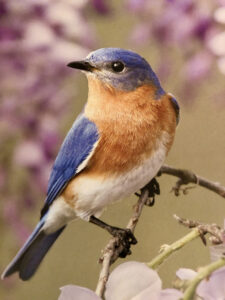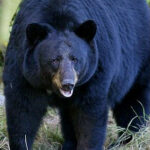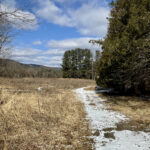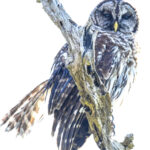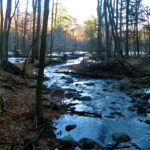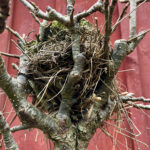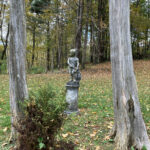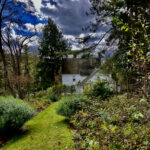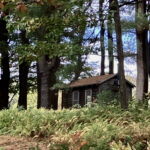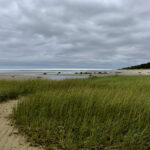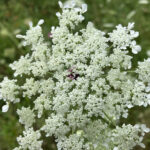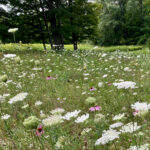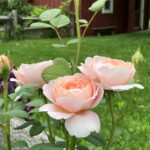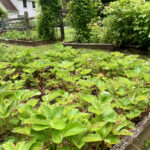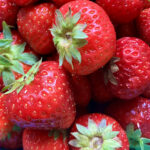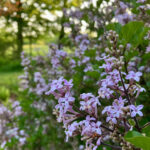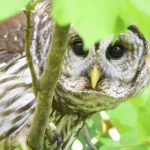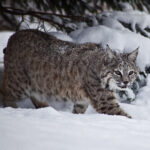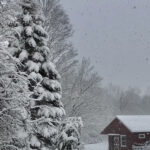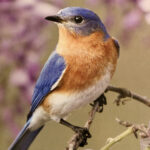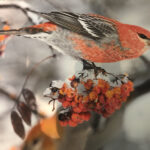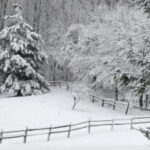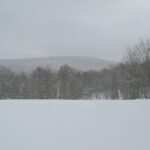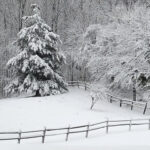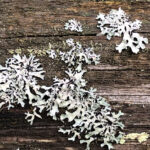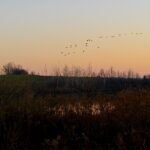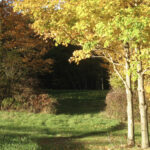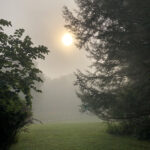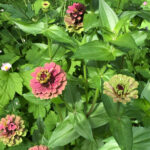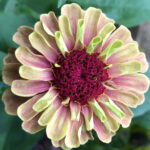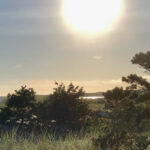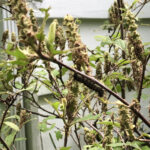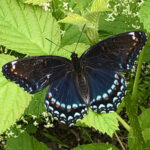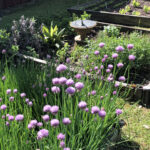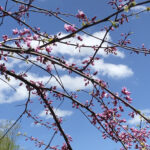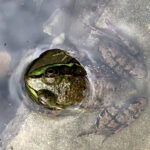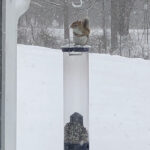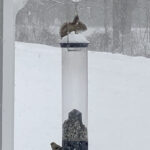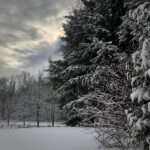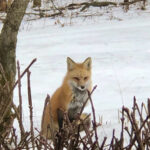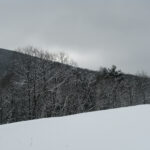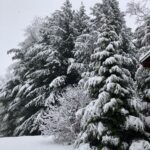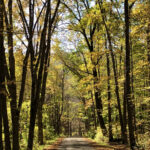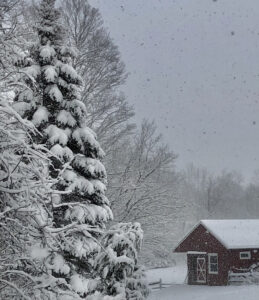 I love the way snow transforms the world around us in mysterious and beautiful ways. How the mountains disappear into the sky and the fields swell with drifts. How the limbs of the spruces become draped with ermine and the last of the oak leaves — high up in the crown, gloved in white — clap wildly in the wind. Snow lends itself to imagery — from Emily Dickinson’s “leaden sieves” and “alabaster wool” to Robert Frost’s extended metaphor of suicidal thoughts in “Stopping by Woods”—with, no doubt, thousands of other examples in between. One of my favorites comes at the end of this poem by Robert Bly who died in Continue reading
I love the way snow transforms the world around us in mysterious and beautiful ways. How the mountains disappear into the sky and the fields swell with drifts. How the limbs of the spruces become draped with ermine and the last of the oak leaves — high up in the crown, gloved in white — clap wildly in the wind. Snow lends itself to imagery — from Emily Dickinson’s “leaden sieves” and “alabaster wool” to Robert Frost’s extended metaphor of suicidal thoughts in “Stopping by Woods”—with, no doubt, thousands of other examples in between. One of my favorites comes at the end of this poem by Robert Bly who died in Continue reading
Snowfall in the Afternoon
Harbinger of happiness
I still depend upon printed weekly planners and wall calendars to keep track of my life. There’s something so satisfying about noting down all the important coming events in red ink by hand on actual paper at the beginning of each year. Something childishly exciting about thumbing through the neatly lined Filofax pages to discover what day of the week your birthday or anniversary will fall on. You hold your future in your hands in a way that I just don’t think is possible with digital versions of the same. What I love most, though, is opening the Audubon Songbird wall calendar every year and seeing which birds will be featured in the twelve months ahead. I was delighted to discover that the Eastern Bluebird, one of my favorites, is the bird of the month for June Continue reading
Lichen
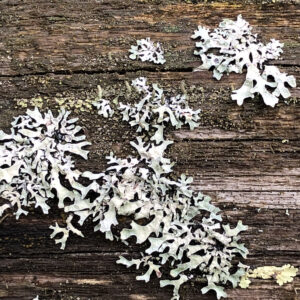 In this in-between season, before the snow falls, when the light slants at a lower angle, the eye is drawn to what the foliage and flowers had kept hidden: the almost otherworldly beauty of lichens. Splayed across stones, spreading over old walls and rotting wood, lichens thrive in the most unlikely places. From sea level to alpine heights, lichens can grow in Arctic tundra, sandy deserts, rocky coastlines, even toxic slag heaps. Though they sometimes look moss-like, they’re not related to moss — or any other plant. Lichens are actually composite, symbiotic organisms: Continue reading
In this in-between season, before the snow falls, when the light slants at a lower angle, the eye is drawn to what the foliage and flowers had kept hidden: the almost otherworldly beauty of lichens. Splayed across stones, spreading over old walls and rotting wood, lichens thrive in the most unlikely places. From sea level to alpine heights, lichens can grow in Arctic tundra, sandy deserts, rocky coastlines, even toxic slag heaps. Though they sometimes look moss-like, they’re not related to moss — or any other plant. Lichens are actually composite, symbiotic organisms: Continue reading
First Fall
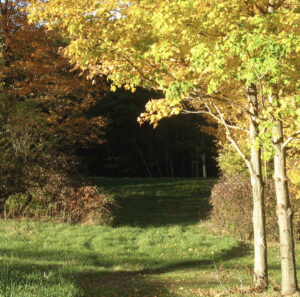 “We look at the world once, in childhood, the rest is memory,” Nobel Prize-winning poet Louise Glück wrote in her poem “Nostos”. I’ve been thinking about the wisdom of those lines these past few golden weeks in the Berkshires. Working in the garden as the last of the leaves drift down from the maples, I realize how much of what I feel is filtered through the past. The smell of woodsmoke. The honking of geese at night. The full Hunter’s moon rising over Harvey Mountain. All these moments have a feeling of déjà vu, memories piled on top of memories, smoldering like Continue reading
“We look at the world once, in childhood, the rest is memory,” Nobel Prize-winning poet Louise Glück wrote in her poem “Nostos”. I’ve been thinking about the wisdom of those lines these past few golden weeks in the Berkshires. Working in the garden as the last of the leaves drift down from the maples, I realize how much of what I feel is filtered through the past. The smell of woodsmoke. The honking of geese at night. The full Hunter’s moon rising over Harvey Mountain. All these moments have a feeling of déjà vu, memories piled on top of memories, smoldering like Continue reading
Mist
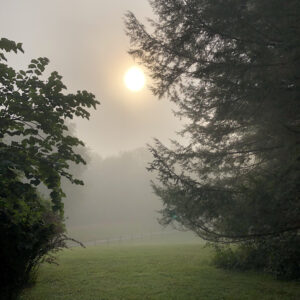 These early Autumn mornings often arrive cocooned in mist — beautiful, mysterious, and somewhat haunting. There’s nothing necessarily poetic about mist; meteorologically, it’s just the result of longer nights and the warmer earth interacting with the cooler air, causing water droplets to form close to the ground. But it’s hard to look out over a shrouded field, the hills a ghost of a silhouette in the distance, without feeling a sense of wonder. What’s out there? With a kind of abracadabra flourish, the world as we know it Continue reading
These early Autumn mornings often arrive cocooned in mist — beautiful, mysterious, and somewhat haunting. There’s nothing necessarily poetic about mist; meteorologically, it’s just the result of longer nights and the warmer earth interacting with the cooler air, causing water droplets to form close to the ground. But it’s hard to look out over a shrouded field, the hills a ghost of a silhouette in the distance, without feeling a sense of wonder. What’s out there? With a kind of abracadabra flourish, the world as we know it Continue reading
Zinnias
 Zinnias are the clowns of the late summer garden. Wacky, sporting mis-matched and often outrageous color combinations, they bob behind the ranks of chic perennials on stalks as long and sturdy as stilts. They’re just too silly to be taken seriously by any self-respecting gardener and yet, by the end of August, they’re often the only colorful things left standing in the border. I’ve come to depend on them over the years and, after Continue reading
Zinnias are the clowns of the late summer garden. Wacky, sporting mis-matched and often outrageous color combinations, they bob behind the ranks of chic perennials on stalks as long and sturdy as stilts. They’re just too silly to be taken seriously by any self-respecting gardener and yet, by the end of August, they’re often the only colorful things left standing in the border. I’ve come to depend on them over the years and, after Continue reading
Heat
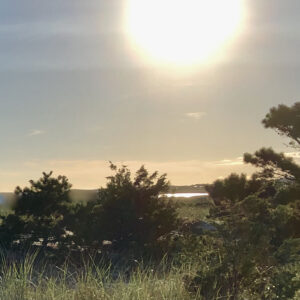 The heat this past week was no joke. It wasn’t the sticky neck or blurry glasses stuff of most mid-summers. Iced tea on the back screen porch was no remedy. Or a fan in a darkened bedroom. This was a mean heat, an in-your-face heat, and its brutish intensity just kept coming. It’s gone now, but it’s the kind of bully that will circle back, pumped up and eager for another round. It made me Continue reading
The heat this past week was no joke. It wasn’t the sticky neck or blurry glasses stuff of most mid-summers. Iced tea on the back screen porch was no remedy. Or a fan in a darkened bedroom. This was a mean heat, an in-your-face heat, and its brutish intensity just kept coming. It’s gone now, but it’s the kind of bully that will circle back, pumped up and eager for another round. It made me Continue reading
Lepidoptera
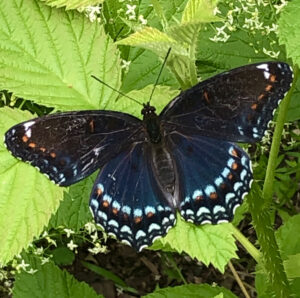 Though both moths and butterflies are classified as Lepidoptera and are often confused with one another, there are several anatomical ways to tell them apart. Their antennae, wings, pupae, and eyes are different, though it might take an advanced degree or microscope to notice the minuscule distinctions. Over the last few months, I’ve been developing a Continue reading
Though both moths and butterflies are classified as Lepidoptera and are often confused with one another, there are several anatomical ways to tell them apart. Their antennae, wings, pupae, and eyes are different, though it might take an advanced degree or microscope to notice the minuscule distinctions. Over the last few months, I’ve been developing a Continue reading
Familiar faces
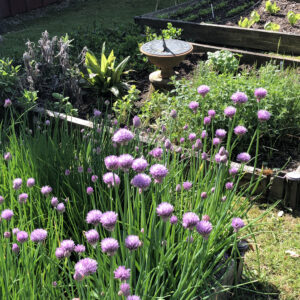 The snake is back in the vegetable garden. I heard him this morning, slithering through the dead leaves between the compost bin and the sprouting raspberry canes. I haven’t seen him yet, but I know what he looks like: a sinuous foot or so of black checkerboard skin with bright yellow racing stripes running down the length of his body. Generations of garter snakes have staked out Continue reading
The snake is back in the vegetable garden. I heard him this morning, slithering through the dead leaves between the compost bin and the sprouting raspberry canes. I haven’t seen him yet, but I know what he looks like: a sinuous foot or so of black checkerboard skin with bright yellow racing stripes running down the length of his body. Generations of garter snakes have staked out Continue reading
Color of the Sky
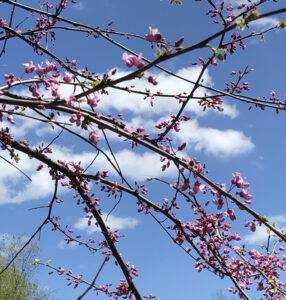 Spring is arriving in the Berkshires in fits and starts. It’s a slightly disorienting, in-between time. The sun is higher and stronger, but the trees are just beginning to leaf out, and the harsh bright light can be blinding. It’s cold enough some nights to have a fire, but it’s often still daylight when we sit down to dinner. Except for the bright chrome yellow splashes of daffodils and forsythia, nature’s palette is pretty much limited to shades of dried brown and timid green. Incremental changes are easy to overlook: the road, filled with muddy ruts a week or so ago, is hardening again, and there’s a soft reddish haze in the underbrush. At night the spring peepers fill the air with their high-pitched choruses — like the ringing of tambourines. It’s coming! It’s coming, they seem to say.
Spring is arriving in the Berkshires in fits and starts. It’s a slightly disorienting, in-between time. The sun is higher and stronger, but the trees are just beginning to leaf out, and the harsh bright light can be blinding. It’s cold enough some nights to have a fire, but it’s often still daylight when we sit down to dinner. Except for the bright chrome yellow splashes of daffodils and forsythia, nature’s palette is pretty much limited to shades of dried brown and timid green. Incremental changes are easy to overlook: the road, filled with muddy ruts a week or so ago, is hardening again, and there’s a soft reddish haze in the underbrush. At night the spring peepers fill the air with their high-pitched choruses — like the ringing of tambourines. It’s coming! It’s coming, they seem to say.
Here’s a poem by the late, great American poet Tony Hoagland about a moment like this. The New York Times wrote that “his erudite comic poems are backloaded with heartache and longing, and they function, emotionally, like improvised explosive devices: The pain comes at you from the cruelest angles, on the sunniest of days.”
A Color of the Sky
by Tony Hoagland
Windy today and I feel less than brilliant,
driving over the hills from work.
There are the dark parts on the road
when you pass through clumps of wood
and the bright spots where you have a view of the ocean,
but that doesn’t make the road an allegory.
I should call Marie and apologize
for being so boring at dinner last night,
but can I really promise not to be that way again?
And anyway, I’d rather watch the trees, tossing
in what certainly looks like sexual arousal.
Otherwise it’s spring, and everything looks frail;
the sky is baby blue, and the just-unfurling leaves
are full of infant chlorophyll,
the very tint of inexperience.
Last summer’s song is making a comeback on the radio,
and on the highway overpass,
the only metaphysical vandal in America has written
MEMORY LOVES TIME
in big black spraypaint letters,
which makes us wonder if Time loves Memory back.
Last night I dreamed of X again.
She’s like a stain on my subconscious sheets.
Years ago she penetrated me
but though I scrubbed and scrubbed and scrubbed,
I never got her out,
but now I’m glad.
What I thought was an end turned out to be a middle.
What I thought was a brick wall turned out to be a tunnel.
What I thought was an injustice
turned out to be a color of the sky.
Outside the youth center, between the liquor store
and the police station,
a little dogwood tree is losing its mind;
overflowing with blossomfoam,
like a sudsy mug of beer;
like a bride ripping off her clothes,
dropping snow white petals to the ground in clouds,
so Nature’s wastefulness seems quietly obscene.
It’s been doing that all week:
making beauty,
and throwing it away,
and making more.
The night migrations
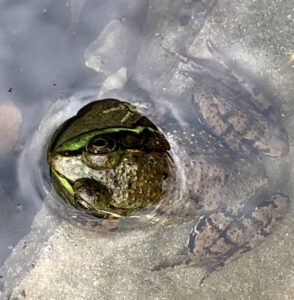 I woke up in the middle of the night and heard the wild geese overhead. Their cries seemed to go on and on. This is the time of year when hundreds of thousands of birds are migrating across the skies under the cover of darkness. The Berkshire fields may still be a sodden uniform beige, but everywhere around us life is stirring. The witch hazel has been in gaudy bloom for almost a month now. Daffodils and alliums are wriggling their green fingers up through the earth. Phoebes are building a nest under the eaves of the barn. This morning, I noticed that the frog pond, covered in ice just a few days ago, had thawed. The water was rippling — as though someone had tossed in a handful of pebbles. Looking closer, I saw half a dozen small green frogs bobbing on the surface and serenading each other with their strange croaking songs.
I woke up in the middle of the night and heard the wild geese overhead. Their cries seemed to go on and on. This is the time of year when hundreds of thousands of birds are migrating across the skies under the cover of darkness. The Berkshire fields may still be a sodden uniform beige, but everywhere around us life is stirring. The witch hazel has been in gaudy bloom for almost a month now. Daffodils and alliums are wriggling their green fingers up through the earth. Phoebes are building a nest under the eaves of the barn. This morning, I noticed that the frog pond, covered in ice just a few days ago, had thawed. The water was rippling — as though someone had tossed in a handful of pebbles. Looking closer, I saw half a dozen small green frogs bobbing on the surface and serenading each other with their strange croaking songs.
Here’s a poem by Louse Glück who, among a lifetime of poetic achievements, was awarded the Nobel Prize in Literature. Like so much of her work, this seemingly simple meditation has the power and complexity of a Buddhist koan.
The Night Migrations
Louse Glück
This is the moment when you see again
the red berries of the mountain ash
and in the dark sky
the birds’ night migrations.
It grieves me to think
the dead won’t see them—
these things we depend on,
they disappear.
What will the soul do for solace then?
I tell myself maybe it won’t need
these pleasures anymore;
maybe just not being is simply enough,
hard as that is to imagine.
The Dead of Winter
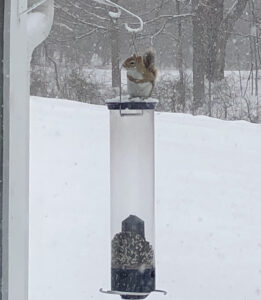 It snowed last night. It’s snowing now. It will snow through the afternoon. There’s been a rhythm and repetitiveness to this winter’s weather that’s a bit like a Latin conjugation: amo, amas, amat. Though there’s been very little to love about these past weeks of dead batteries and leaking roofs. Despite Valentine’s Day, there’s no sweet-talking February. Its language tends to be blunt and monosyllabic, composed of mostly Old- and Middle-English words of Germanic origin: sleet, ice, hail, wind, drift, slide, fall. The poem below by the late American poet Samuel Menashe is constructed almost entirely of such words. A review in the New York Times of his collected work said, “each poem reads as if it’s been handblown, filled with an exactly measured dose of Wisdom and then polished 9,000 times by the world’s most precisely folded chamois.”
It snowed last night. It’s snowing now. It will snow through the afternoon. There’s been a rhythm and repetitiveness to this winter’s weather that’s a bit like a Latin conjugation: amo, amas, amat. Though there’s been very little to love about these past weeks of dead batteries and leaking roofs. Despite Valentine’s Day, there’s no sweet-talking February. Its language tends to be blunt and monosyllabic, composed of mostly Old- and Middle-English words of Germanic origin: sleet, ice, hail, wind, drift, slide, fall. The poem below by the late American poet Samuel Menashe is constructed almost entirely of such words. A review in the New York Times of his collected work said, “each poem reads as if it’s been handblown, filled with an exactly measured dose of Wisdom and then polished 9,000 times by the world’s most precisely folded chamois.”
The Dead of Winter
by Samuel Menashe
In my coat I sit
At the window sill
Wintering with snow
That did not melt
It fell long ago
At night, by stealth
I was where I am
When the snow began
Vixen
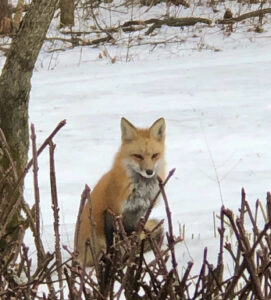 I sensed her — a blur in the woods, a fresh set of tracks in the snow — before I saw her. At times, when the feeders were usually aflutter with activity, the birds would suddenly vanish. I had the unsettling sensation of being watched. And then one morning, hunger or familiarity emboldening her, she trotted out of the woods: a red fox with black
I sensed her — a blur in the woods, a fresh set of tracks in the snow — before I saw her. At times, when the feeders were usually aflutter with activity, the birds would suddenly vanish. I had the unsettling sensation of being watched. And then one morning, hunger or familiarity emboldening her, she trotted out of the woods: a red fox with black
socks and the triangular facial features that marked her as a vixen. She skirted the house with cautious fluidity, slowing to a stop in the front yard where a pair of gray squirrels were scavenging obliviously under the birdfeeders.
She attacked with lightning speed, driving one up into the eaves, the other scurrying to safety. Gray foxes have hook-shaped claws which allow them to climb trees after their prey, but the red fox is more earthbound. The vixen’s lunch made a flying leap into the trees and escaped. The fox lingered in the yard (in the photo she’s watching the feeders from behind our long border) until another fox — larger, seemingly older, probably male — approached and they circled each other for a time, then ran off together into the woods.
I’m not sure why foxes seem so magical, but there’s something otherworldly about their gaze (like cats, red foxes have vertical pupils to enhance their night vision). Ancient lore holds that foxes bring good luck — and news from the afterlife — both of which were true, it seems to me, for our lucky squirrel.
Here’s a poem on the subject by the great American poet W. S. Merwin. As is so often the case with Merwin’s work, the meaning is amorphous and shapeshifting, like some strikingly beautiful creature you might have seen — that just vanished.
Vixen
By W. S. Merwin
Comet of stillness princess of what is over
high note held without trembling without voice without sound
aura of complete darkness keeper of the kept secrets
of the destroyed stories the escaped dreams the sentences
never caught in words warden of where the river went
touch of its surface sibyl of the extinguished
window onto the hidden place and the other time
at the foot of the wall by the road patient without waiting
in the full moonlight of autumn at the hour when I was born
you no longer go out like a flame at the sight of me
you are still warmer than the moonlight gleaming on you
even now you are unharmed even now perfect
as you have always been now when your light paws are running
on the breathless night on the bridge with one end I remember you
when I have heard you the soles of my feet have made answer
when I have seen you I have waked and slipped from the calendars
from the creeds of difference and the contradictions
that were my life and all the crumbling fabrications
as long as it lasted until something that we were
had ended when you are no longer anything
let me catch sight of you again going over the wall
and before the garden is extinct and the woods are figures
guttering on a screen let my words find their own
places in the silence after the animals
Good bones
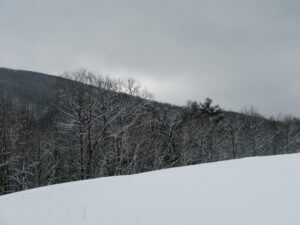 This is the time of year when the contours of the Berkshire hills once again dominate the view. Gentle and curvaceous, they recline against the winter landscape, silent as the snow that often covers their flanks. Melville imagined Mount Greylock which filled his vista to the north as a white whale breaching the surface: Moby-Dick in all his ferocious beauty. Harvey Mountain, which looms above us can seem like an enormous wave about to break, its spume of snow whistling down through the hemlocks. The Berkshires are among the oldest mountains in the world, first formed when Africa collided with North America creating the Appalacian range, then gradually weathered and carved into their present shape — earth’s good bones — over the last 500 million years.
This is the time of year when the contours of the Berkshire hills once again dominate the view. Gentle and curvaceous, they recline against the winter landscape, silent as the snow that often covers their flanks. Melville imagined Mount Greylock which filled his vista to the north as a white whale breaching the surface: Moby-Dick in all his ferocious beauty. Harvey Mountain, which looms above us can seem like an enormous wave about to break, its spume of snow whistling down through the hemlocks. The Berkshires are among the oldest mountains in the world, first formed when Africa collided with North America creating the Appalacian range, then gradually weathered and carved into their present shape — earth’s good bones — over the last 500 million years.
This poem by the American poet Maggie Smith went viral after the Orlando nightclub shooting five years ago and has now been shared hundreds of thousands of times. Though dark, I share it here as a fitting way of closing out this dismal year.
Good Bones
by Maggie Smith
Life is short, though I keep this from my children.
Life is short, and I’ve shortened mine
in a thousand delicious, ill-advised ways,
a thousand deliciously ill-advised ways
I’ll keep from my children. The world is at least
fifty percent terrible, and that’s a conservative
estimate, though I keep this from my children.
For every bird there is a stone thrown at a bird.
For every loved child, a child broken, bagged,
sunk in a lake. Life is short and the world
is at least half terrible, and for every kind
stranger, there is one who would break you,
though I keep this from my children. I am trying
to sell them the world. Any decent realtor,
walking you through a real shithole, chirps on
about good bones: This place could be beautiful,
right? You could make this place beautiful.

